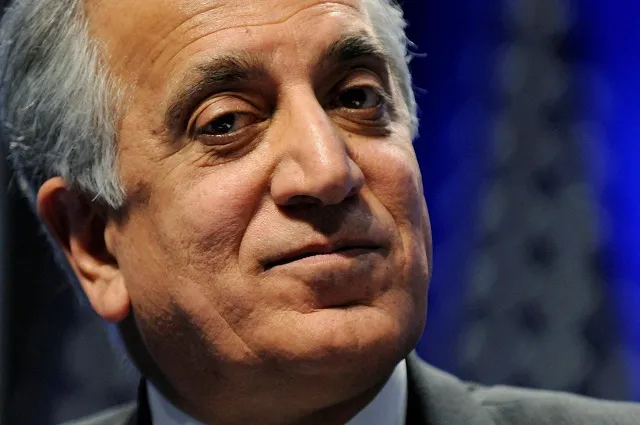Taliban đã bác bỏ rất nhiều yêu cầu từ các cường quốc trong khu vực về việc để cho quan chức chính phủ Afghanistan tham gia và cuộc đàm phán, nhấn mạnh rằng Mỹ mới chính là đối thủ duy nhất của nhóm này trong cuộc chiến kéo dài 17 năm qua, chính quyền Kabul chỉ là chế độ “bù nhìn”.

Đặc phái viên Mỹ về Afghanistan Zalmay Khalilzad. Ảnh: Reuters
Nhóm quân nổi dậy này sau khi bị đẩy lui bởi liên quân do Mỹ dẫn đầu đã kêu gọi tổ chức một cuộc gặp với quan chức chính phủ Mỹ tại Saudi Arabia tuần này vì sự khăng khăng của Riyadh phải có mặt chính quyền Afghanistan trong bàn đàm phán.
Đây sẽ là cuộc đàm phán thứ tư trong chuỗi đàm phán giữa lãnh đạo Taliban và đặc phái viên Mỹ về Afghanistan Zalmay Khalilzad.
Cuộc gặp sẽ diễn ra tại Doha và kéo dài trong hai ngày.
Hồi tháng 12/2018, Saudi Arabia, Pakistan và các Tiểu vương quốc Ả Rập thống nhất (UAE) đã tham gia vào vòng đàm phán cùng với Taliban.
Vì thế cuộc gặp lần này là dành riêng cho Mỹ, với mục đích thảo luận về việc Mỹ rút quân, trao đổi tù nhân và dỡ bỏ lện cấm di chuyển của các lãnh đạo cấp cao của tổ chức Taliban.
Cuộc chiến với Taliban tại Afghanistan là cuộc can thiệp quân sự dài nhất ở nước ngoài của Mỹ.
Tổng thống Trump tháng trước đã có tuyên bố sẽ rút hàng ngàn binh sĩ đang tham chiến tại Afghanistan về nước.
Afghan Taliban, U.S. to sit down to peace talks on Wednesday: sources
(Reuters) - Afghan Taliban representatives and U.S. officials will sit down to two days of peace talks on Wednesday in Qatar but Afghan government officials will not be involved, senior Taliban members said.
The Taliban have rejected numerous requests from regional powers to allow Afghan officials to take part in the talks, insisting that the United States is their main adversary in the 17-year war and that Kabul is a "puppet" regime.
The insurgents, seeking to reimpose strict Islamic law after their 2001 ouster by U.S.-led troops, called off their meeting with the U.S. officials in Saudi Arabia this week because of Riyadh's insistence on bringing the Western-backed Afghan government to the table.
The talks will be the fourth in a series between Taliban leaders and U.S. special envoy Zalmay Khalilzad.
“After mutual consultations, we are going to meet U.S. officials in Doha on Wednesday. The meeting will continue for two days - Wednesday and Thursday,” said a senior member of the Afghan Taliban on condition of anonymity.
Pakistani and Iranian officials said they were trying to persuade the Taliban to meet Afghan officials.
Another senior Taliban leader confirmed the Qatar meeting and said no other country would be involved.
Saudi Arabia, Pakistan and the United Arab Emirates (UAE) took part in the last round of talks in December.
"This time we want to hold talks with the American officials," said a Taliban leader based in Afghanistan, adding that they would discuss a U.S. withdrawal, prisoner exchange and the lifting of a ban on movement of their leaders.
The war in Afghanistan is America’s longest overseas military intervention. It has cost Washington nearly a trillion dollars and killed tens of thousands of people.
The United States, which sent troops to Afghanistan in the wake of the Sept. 11, 2001, attacks on New York and Washington and at the peak of the deployment had more than 100,000 troops in the country, withdrew most of its forces in 2014, but still keeps around 14,000 troops there as part of a NATO-led mission aiding Afghan security forces and hunting militants.
Reports last month about U.S. President Donald Trump's plans to withdraw thousands of troops from Afghanistan triggered uncertainty in Kabul which depends on the United States and other foreign powers for military support and training.
The U.S. Embassy in Afghanistan did not immediately respond to a request for comment.


